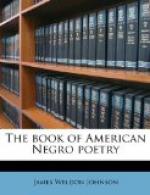It is curious and interesting to trace the growth of individuality and race consciousness in this group of poets. Jupiter Hammon’s verses were almost entirely religious exhortations. Only very seldom does Phillis Wheatley sound a native note. Four times in single lines she refers to herself as “Afric’s muse.” In a poem of admonition addressed to the students at the “University of Cambridge in New England” she refers to herself as follows:
“Ye blooming plants of human
race divine,
An Ethiop tells you ’tis
your greatest foe.”
But one looks in vain for some outburst or even complaint against the bondage of her people, for some agonizing cry about her native land. In two poems she refers definitely to Africa as her home, but in each instance there seems to be under the sentiment of the lines a feeling of almost smug contentment at her own escape therefrom. In the poem, “On Being Brought from Africa to America,” she says:
“’Twas mercy brought
me from my pagan land,
Taught my benighted soul to
understand
That there’s a God and
there’s a Saviour too;
Once I redemption neither
sought or knew.
Some view our sable race with
scornful eye,
‘Their color is a diabolic
dye.’
Remember, Christians, Negroes
black as Cain,
May be refined, and join th’
angelic train.”
In the poem addressed to the Earl of Dartmouth, she speaks of freedom and makes a reference to the parents from whom she was taken as a child, a reference which cannot but strike the reader as rather unimpassioned:
“Should you, my lord, while
you peruse my song,
Wonder from whence my love
of Freedom sprung,
Whence flow these wishes for
the common good,
By feeling hearts alone best
understood;
I, young in life, by seeming
cruel fate
Was snatch’d from Afric’s
fancy’d happy seat;
What pangs excruciating must
molest,
What sorrows labor in my parents’
breast?
Steel’d was that soul
and by no misery mov’d
That from a father seiz’d
his babe belov’d;
Such, such my case. And
can I then but pray
Others may never feel tyrannic
sway?”
The bulk of Phillis Wheatley’s work consists of poems addressed to people of prominence. Her book was dedicated to the Countess of Huntington, at whose house she spent the greater part of her time while in England. On his repeal of the Stamp Act, she wrote a poem to King George III, whom she saw later; another poem she wrote to the Earl of Dartmouth, whom she knew. A number of her verses were addressed to other persons of distinction. Indeed, it is apparent that Phillis was far from being a democrat. She was far from being a democrat not only in her social ideas but also in her political ideas; unless a religious meaning is given to the closing lines of her ode to General Washington, she was a decided royalist:
“A crown, a mansion, and a
throne that shine
With gold unfading, Washington!
be thine.”




